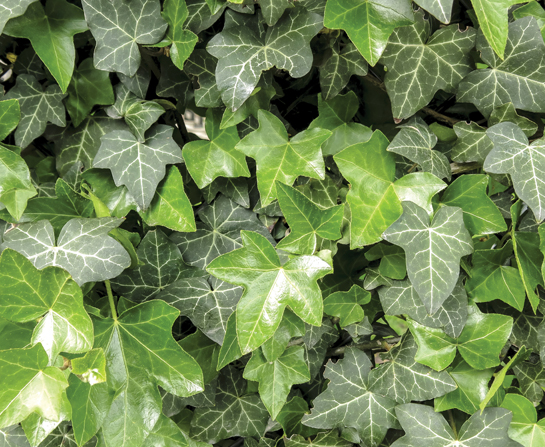A Plant that is Simply Di-Vine
May 1, 2022 Return

The ivy Hedera helix Linn, also known as English Ivy or European Ivy, is a fast-growing, climbing vine plant that mainly grows and spreads in two stages. The first stage or the juvenile stage sees the plant producing 3 to 5 thick, lobed dark green leaves. In its adult stage, the plant produces round umbel-like clusters of greenish-white flowers followed by blue-black berries.
Native to Europe, the plant was brought to various parts of the world by settlers during the colonial regime. Its leaves are widely used to treat respiratory tract ailments.
Relief for the Throat
Ivy leaves were classified under traditional medicine for treatment of the following conditions:
- For the relief of symptoms associated with chronic inflammatory bronchial ailments,
- As an expectorant to aid in conditions such as a common cold or cough,
- As a mucolytic agent to release mucus from the respiratory tract.
- To relieve breathing complications by relaxing airways and dilating bronchioles. Ivy leaf preparations are available in solid or liquid dosage forms for oral consumption. The dosage and administration will vary based on the product, patient age and recommendation by healthcare provider.
How Ivy Works Its ‘Magic’
Ivy leaves contain triterpenoid saponins, mainly hederacosides B and C, flavonoids like rutin, kaempferol and quercetin, caffeic acid derivatives, and sterols.
Ivy leaf preparations exert their effect via the following ways:
- In respiratory diseases, Ivy leaf preparations can relieve severe muscle spasms caused by frequent coughing.
- The saponins in ivy leaf extracts can cause thick, sticky mucus in the throat to become more liquid and fluid. This helps to make it easier to cough out the mucus.
- The flavonoids in ivy leaf block the release of histamines (the substances that give rise to allergy reactions( and thus help to suppress allergic manifestations.
- The saponins, alpha-hederin and hederacoside C in ivy leaf all help to suppress inflammatory conditions of the respiratory tract.
- The triterpenoids in ivy leaf aid in antimicrobial activity against various strains of germs that infect the respiratory system (Staphylococcus, E.Coli, Klebsella pneumoniae) and also the influenza virus. Thus, they can suppress respiratory tract infections.
Side Effects
Side effects of Ivy leaf preparations include mild allergic reactions like rashes, skin irritation, and gastrointestinal complaints. Consumption by children below the age of 2 years and by expectant mothers should only be under medical advice.
References:
Kooperation Phytopharmaka. Available at www.koop-phyto.org
Clinicians Research Based. Available at www.clinicians.co.nz.
European Medicines Agency. Available at www.ema.europa.eu
If you like this article, do subscribe here.
